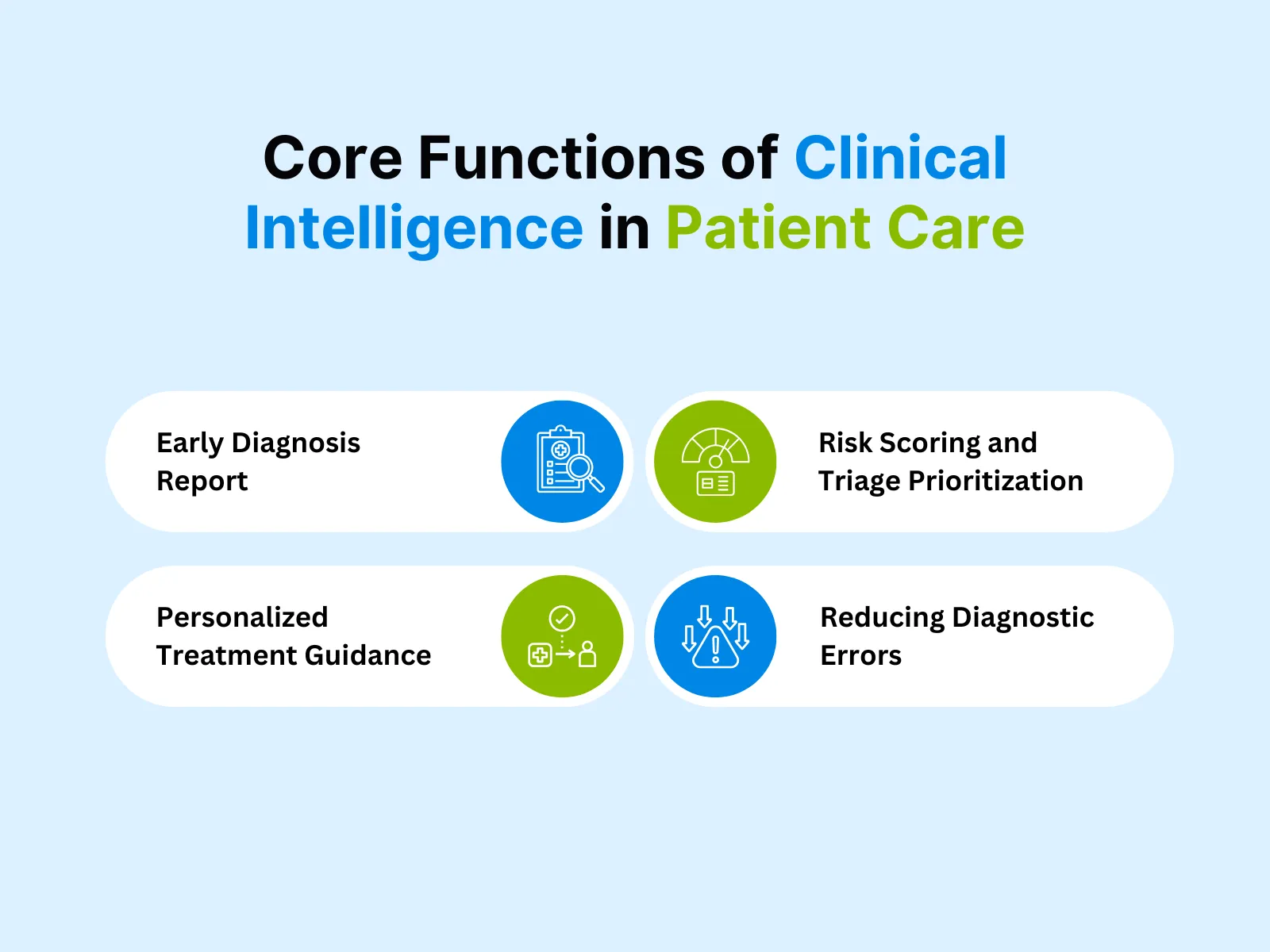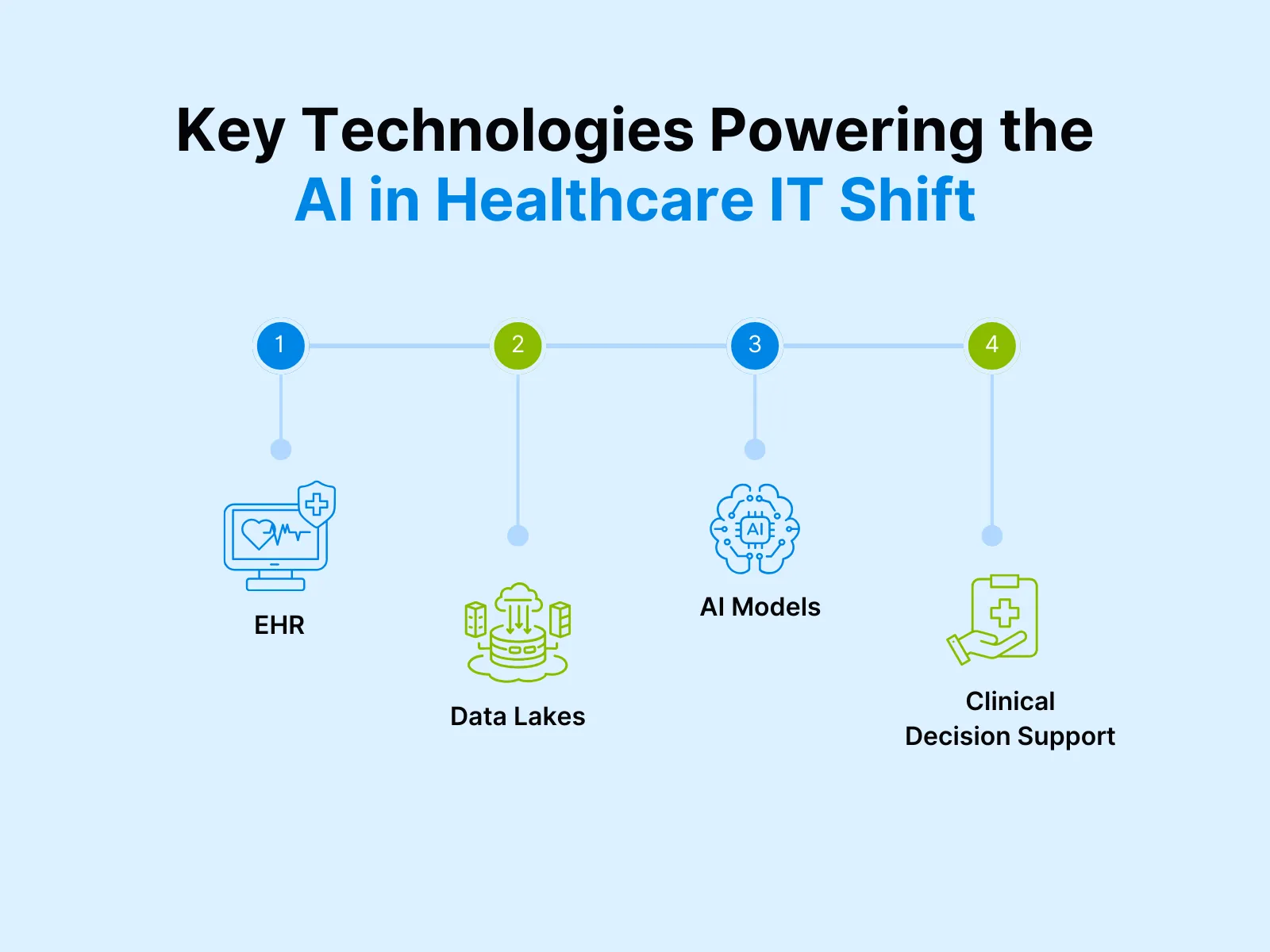AI-Powered Clinical Intelligence at Scale: Redefining Care in Healthcare IT
Healthcare IT is evolving from digitized records to intelligent systems. This blog explores how AI-driven clinical intelligence is transforming patient care, enabling predictive insights, and empowering tech leaders to build smarter, outcome-focused healthtech platforms.

Over the past few years, the healthcare industry has gone through a radical digital transformation. What once used to live in hard-bound files is now stored and accessed through Electronic Health Records (EHS). Hospitals, clinics and healthtech leaders invested heavily in digitization to improve documentation, streamline workflows, centralize data and reduce human errors. These systems became the backbone of healthcare digital transformation, setting the foundation for modern healthcare operations.
But the pressing issue is that while EHR systems surely digitized clinical data, they were not designed to be intelligent.
Even today, physicians and doctors scroll through large volumes of patient records, trying to extract meaningful insights among the noise. Critical decisions are taken based on intuition and fragmented information despite having gigabytes of well-structured data at their fingertips. The whole truth is, digitization was just the beginning. The next revolution lies not in capturing data–but using that data effectively.
This is where AI in healthcare IT comes into picture.
We are now entering a stage where the focus is shifted from record keeping to real-time, meaningful insight generation. AI-driven clinical intelligence is rising as the solution that overlays traditional EHR systems with machine learning, natural language processing, and predictive models to empower doctors with actionable insights.
In other words, healthcare is moving from being data-rich to becoming insight-rich.
“Large healthcare giants with revenues exceeding $10 billion are boldly committing over $50 million to AI projects. Meanwhile, mid-sized organizations, with revenues ranging from $5 billion to $10 billion, are stepping into the AI arena with investments under $50 million.”--Deloitte
So, the burning question for decision-makers become:
“Now that we’ve digitized health data—how do we make it actionable?”
In this blog, we will explore how AI in healthcare IT is turning data into decisions—and transforming outcomes for patients and providers alike.
The Limitations of Traditional EHR Systems
When EHRs were introduced, they promised to streamline workflows, eliminate paper charts and enhance coordination across providers. It also delivered in many ways, from digitized web results and e-prescriptions to faster billing cycles, EHRs laid a solid groundwork for digital transformation of healthcare IT.
But later, it was realized that record-keeping was only the beginning, and now the cracks in the foundation are widening daily.
Most EHR systems were not made keeping in mind intelligence or interoperability in mind. They excel at storing data but fail to turn it into clinical insights. Many healthcare providers still operate on fragmented systems that are not smart enough to share data between two departments, let alone between two institutes. This fragmentation restricts clinicians to see a complete, bird-eye view of the patient’s health.
EHRs also lack real-time decision support. Doctors and nurses have to navigate between multiple screens and scribbled notes to gauge relevant information all while ensuring to make critical decisions at the right time. Instead of making the work easy, EHRs often end up pulling the clinicians backwards.
A recent study from American Management Association (AMA) reveals that over 60% clinicians report dissatisfaction with the usability of traditional EHR systems. Time consumption, poor user interfaces and cognitive overload were the top concerns reported by them.
As observed, it turned out to be that EHRs are retrospective and not predictive. They can easily tell you what has already happened but not predict as to what might happen in the future. There is no alert if a patient’s vitals might fall towards sepsis or a readmission, which is most likely a post discharge. This is the most significant limitation in healthcare IT, especially in an industry where predicting early outcomes could make all the difference.
To bridge this gap, healthcare leaders are now exploring intelligence layers that are built on top of EHRs–systems that can predict early outcomes through artificial intelligence and unlock value of all the critical data that is buried inside. These layers are designed to revolutionize static records into dynamic decision-support tools, enabling more personalized, efficient and preventative care.
Integrate AI-Driven Insights and Predictive Analytics to Elevate Your EHR Systems
Transform legacy data into real-time clinical intelligence that empowers smarter decisions.
What is Clinical Intelligence?

As healthcare systems are evolving beyond digitization, the focus shifts from merely storing data to deriving insights out of it–transforming raw data into actionable insights that improve patient care delivery. This is where clinical intelligence comes into picture. Clinical intelligence refers to strategic use of AI in healthcare IT, leveraging machine learning, predictive models and real-time data analytics to optimize clinical decisions and outcomes.
Clinical intelligence connects the dots across various datasets–electronic health records (EHRs), lab results, imaging, genomics, and even social determinants of health—to present actionable insights at the point of care. Unlike static dashboards, clinical intelligence provides real-time, actionable and hyper-personalized guidance, helping doctors make smarter and faster decisions.
Core functions of clinical intelligence in patient care:
Early Diagnosis Report
Clinical intelligence systems can identify early signs of life-threatening conditions like sepsis, stroke, cancer, cardiac arrest–often hours before symptoms escalate. AI models that are trained on historic EHRs data can flag abnormalities that might be missed by the human eye.
Risk Storing and Triage Prioritization
Hospitals use predictive algorithms to assess patient risk levels and prioritize care. For example, in emergency departments, AI can assist in real-time triage, ensuring that patients who require critical care are attended to swiftly.
Personalized Treatment Guidance
Clinical intelligence can easily recommend unique treatment plans for each patient based on past outcomes, genetic data, and lifestyle information. This leads to better compliance, faster recoveries and improved long-term success.
Reducing Diagnostic Errors
Diagnostic errors remain one of the major causes of medical harm. AI is capable to cross-reference current symptoms with millions of anonymized patient records, thereby reducing the chance of misdiagnosis and enabling accurate clinical decisions.
Real-World Examples of Clinical Intelligence in Action:
- Aidoc utilizes computer vision to scan medical imaging for critical conditions like brain hemorrhages or pulmonary embolisms. It alerts radiologists in real time, significantly reducing diagnosis-to-treatment time.
- Tempus combines clinical and molecular data to guide oncologists in selecting the most effective cancer treatments, tailored to each patient’s genetic profile.
- IBM Watson Health has been deployed in cancer centers to sift through research publications, clinical trial data, and patient records—helping doctors find the best therapeutic options based on evidence.
These solutions exemplify how clinical intelligence is redefining care—from being reactive and generalized to becoming proactive, precise, and deeply personalized. As the backbone of AI-powered patient care, clinical intelligence isn’t just a technological enhancement—it’s a clinical imperative.
Ready to Elevate Patient Care with AI?
Leverage advanced clinical intelligence to enhance decision-making and improve outcomes.
Key Technologies Powering the AI in Healthcare IT Shift

The revolution we are witnessing from EHRs to intelligent clinical systems is fueled by a suite of advanced technologies that unlock value from data. These tools form the base of predictive healthcare analytics, enabling informed decision-making and improved patient outcomes.
Let us take a look at the key drivers of transformation.
Machine Learning & Natural Language Processing
Machine learning algorithms are at the heart of clinical intelligence–feeding on historical data to identify patterns, flab abnormalities in early stages and predict future outcomes. NLP adds another layer of sophistication by structuring unstructured data like physician notes, discharge summaries or pathology reports.
Converting these entries into structured insights, NLP fills a major gap in EHR utility. For example, identifying medication conflicts and identifying early signs of chronic illness hidden in progress notes becomes more efficient.
Predictive Healthcare Analytics
This technology leverages historical data to forecast patient outcomes, enabling timely interventions. Predictive models are used to:
- Alert physicians on early symptoms before critical condition emerges
- Assess readmission risks after discharge
- Identify populations at risk for conditions like diabetes, heart failure, COPD, etc.
Hospitals implementing predictive analytics report better triage accuracy, lower costs and reduced avoidable admissions.
FHIR-Based Interoperability
Fragmented systems and scattered data have plagued healthcare IT. Fast Healthcare Interoperability Resources (FHIR) is a modern API-driven standard that facilitates secure and seamless exchange of data between systems.
Hospitals can easily connect EHR to external systems like monitoring apps, wearables, AI tools and other third-party health data services that makes a holistic patient view not only practical but possible.
Healthcare Data Platforms and Data Lakes
Modern healthcare data platforms are built around Data lakes which are central depositories that handle both structured and unstructured data. These platforms collect inputs from lab systems, imaging centers, genomic databases, patient portals and IoT devices.
Data lakes allow data scientists and AI developers to train models on diverse datasets boosting the development of personalized insights. This architectural shift is essential for building scalable, secure and future-ready intelligent care systems.
Use Cases and Impact Across the Care Journey
AI is transforming how care is being delivered, managed and optimized across the entire patient journey. From operations to chronic care management, AI for patient outcomes is delivering measurable impact and enabling faster decisions.
Let us take a look at key areas where healthcare automation is making a difference.
Predicting Discharge and Bed Availability
Efficiency of hospital is often hindered due to delayed discharges and bed management chaos. AI-powered models are used to forecast patient discharge timelines with complete accuracy allowing admin staff to allocate rooms, plan staffing and minimize wait times in emergencies.
These tools analyze patient condition, clinical notes and length of stay data to predict who is likely to be discharged and when. This kind of foresight helps hospitals avoid overcrowding, streamline patient flow, and minimize operational bottlenecks.
Reducing Readmission Risks
Treating chronic illnesses like diabetes and heart failure requires long-term visibility into patient risk. AI models use historical data, medication adherence, vital signs and behavioral data to flag patients who might return within 30 days after discharge.
According to McKinsey, AI can reduce hospital readmission by up to 50% in high-risk patient groups, significantly cutting costs and improving care continuity.
These insights empower care teams to deliver proactive interventions, from follow-up scheduling to remote monitoring before critical situations emerge.
Accelerating Diagnosis with Computer Vision
Radiologists have to deal with large volumes of imaging data everyday. AI-based tools are augmenting diagnostic accuracy by detecting anomalies in X-rays, MRIs and CT Scans–sometimes identifying critical issues like stores before doctors can do.
Solutions from vendors like Aidoc and Zebra Medical Vision integrate directly with PACs systems, flagging urgent cases in real time and prioritizing them for review. It results in faster turnarounds, reduced diagnostic errors and life-saving early interventions.
Risk Stratification at Scale
AI is enabling health systems to analyze vast patient populations and identify those at highest risk of adverse outcomes. Healthcare leaders can target high-risk groups for preventive care based on social determinants and behavioral patterns.
This level of healthcare automation helps transition from reactive to proactive care models–where interventions happen before a crisis, not after.
Leverage AI to Revolutionize Insurance Operations and Streamline DMS Efficiently
Curtail expenses and utilize resources optimally to delight customers
Challenges and Considerations
The healthcare industry has stepped up from digitization to intelligence, several critical issues are rising–especially around trust, fairness and adoption. For AI in healthcare to c\scale properly, it must navigate a complex ecosystem of regulations, ethical standards and clinical responsiveness.
Data Privacy and HIPAA Compliance
At the foundation lies healthcare data privacy. AI models depend on sensitive patient data, which must be handled in compliance with HIPAA and other global privacy frameworks. From de-identification and secure data storage to governance policies for access control, healthcare organizations must ensure airtight protections are in place. A single privacy lapse can erode trust and stall innovation.
Bias in Training Data
AI Bias in healthcare has become a pressing concern. When training data reflects anomalies or lacks demographic diversity. AI models are prone to producing biased outputs which can result in unfair risk scores or treatment plans. This can affect underrepresented populations, broadening existing disparities.
Managing bias requires constant evaluation of datasets, inclusion of diverse populations in training data, and bias-detection tools as part of model development pipelines.
Model Explainability for Clinical Approval
Doctors and physicians demand transparency. Black-box AI systems that do not offer any rationale for their predictions are not likely to gain trust or FDA approval for that matter. For AI to support clinical decisions whether in diagnostics, triage or treatment planning it must provide logical reasons.
Explainability is not just a technical department but is also a clinical imperative. Tools like SHAP, LIME and attention healthmaps are helping bridge the gap between algorithmic logic and human understanding.
Integration into Clinical Workflows
Even the most powerful AI solution is careless if it disrupts care delivery. To gain traction, AI tools must directly plug into existing systems, especially electronic health records. Real-time insights must be accessible at the point of care, without adding to cognitive load or workflow friction. Integration is not only a technical challenge but a design challenge as well.
Even though these challenges prevail, once thing is clear that AI is no longer a promise–it is being deployed at scale in institutions like Mayo Clinic, Mount Sinai and Kaiser Permanente.
How TRooTech Helps Build AI-Driven Healthcare IT Solutions
As the healthcare industry is gradually shifting towards intelligent systems, TRooTech equips them with full-stack solutions that blend regulatory compliance, AI innovation, and seamless data interoperability.
Below is the breakdown of how TRooTech enables digital health transformation:
Building HIPAA-Compliant Custom Platforms
Compliance is non-negotiable in healthcare. TRooTech has expertise in developing custom healthcare platforms that are fully HIPPA-compliant, ensuring patient data is protected across every touchpoint. Whether it is a patient portal, telemedicine interface or back-office tool, our solutions are built with privacy-first architecture–developing trust, security and regulatory alignment.
AI/ML Development for Predictive Models
To deliver proactive care, TRooTech builds advanced AI and machine learning models customized as per unique healthcare needs. These models power:
- Readmission Risk Prediction
- Early Deterioration Detection
- Triage Optimization
- Treatment Recommendation Engines
These capabilities allow the healthcare industry to move from static reporting to intelligent care, enhancing patient safety.
Integration with EHRs Using HL7 and FHIR
Identifying the data silos badgering the healthcare systems, TRooTech ensures smooth integration with Electronic Health Record (EHR) systems using HL7 and FHIR protocols. This interoperability-first approach enables seamless flow between two systems, breaking down barriers across departments, facilities and partner networks–creating a truly connected care ecosystem.
Insightful Dashboards with Clinical Decision Support Systems
TRooTech empowers care teams with custom-built Clinical Decision Support Systems (CDSS) and real-time dashboards. These tools offer critical insights at the point of care, enabling:
- Informed decision-making
- Real-time patient monitoring
- Risk scoring and alerting
- Streamlined workflows
Respond faster and smarter by operationalizing your data with TRooTech.
Cloud Native Healthcare Analytics Infrastructure
To handle the scale and speed of healthcare data, we at TRooTech offer cloud-native analytics infrastructure built for agility and resilience. From data lake architecture to streaming analytics pipelines, their solutions process structured and unstructured data in real time–enabling AI models to generate insights that matter.
Conclusion: From Data-Rich to Insight-Rich Healthcare
The healthcare industry has spent the last two decades going digital shifting from paper to EHRs, digitizing imaging and capturing every facet of patient care in data. But in healthcare, digitization and digital transformation is not enough.
The next step is turning that raw data into actionable insights. AI and clinical intelligence platforms are already showing us what’s possible: instant diagnosis, earlier interventions, optimized workflows, and improved outcomes across the board. These aren’t just technological upgrades—they’re clinical game-changers.
It’s time for healthcare leaders to move from data-rich to insight-rich ecosystems, where AI doesn’t replace clinicians but empowers them with clarity and foresight.
Organizations that act now can build a future-ready foundation for innovation. Those that wait risk falling behind in a rapidly evolving landscape.
FAQs
Clinical intelligence refers to the use of AI, machine learning, and analytics on healthcare data to deliver actionable insights. It helps identify risks, predict outcomes, and guide personalized care decisions across the patient journey.
AI layers on top of EHRs bring predictive analytics, real-time alerts, risk scoring, and diagnostic support—capabilities that traditional record-keeping platforms lack. This transition marks the shift from data capture to data intelligence.
Core enablers include machine learning, natural language processing (NLP), FHIR-based interoperability, healthcare data lakes, and predictive analytics engines. These tools transform raw data into clinical decision support.
Yes—with the right architecture. HIPAA-compliant platforms, explainable AI models, and secure cloud-native environments are essential to ensure ethical and regulatory alignment.
TRooTech delivers full-spectrum healthcare IT services—from HIPAA-compliant platform development and HL7/FHIR integrations to predictive modeling and real-time dashboards. We help healthcare leaders move from pilot to production, faster.

